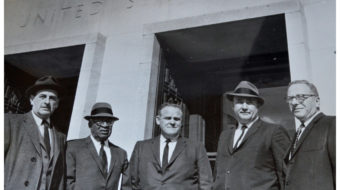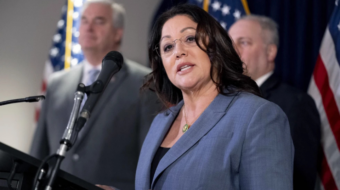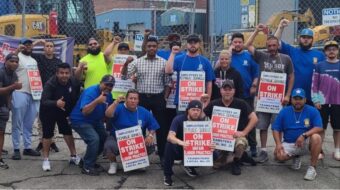CHICAGO — If America’s union members have anything to say about it, come Nov. 2 this country’s ship of state will be making a sharp course correction. And they’ll have plenty to say about it, judging from the highly detailed plans laid out at an AFL-CIO Executive Council meeting totally devoted to politics, held here Aug. 9-11.
“We will have the finest political effort in the history of the labor movement,” AFL-CIO President John Sweeney told reporters. Sweeney declared emphatically, “We are leading a solid, united labor movement.”
It’s unusual to mobilize volunteers on a weekday, but on Thursday, Sept. 2, from 4 to 8 p.m., 25,000 union volunteers will be hitting the streets just as George W. Bush accepts the Republican nomination. Using computer-generated walk maps, they will disperse from 150 “walk sites” mostly in battleground states to knock on 1 million union household doors with flyers comparing Bush’s stands on jobs, health care and retirement security, “our basic issues,” to those of Democratic nominee John Kerry, says Denise Mitchell, Sweeney’s assistant for public affairs.
The allocation of resources is unprecedented. The federation is spending $44 million, and that is being added to by its affiliates, to make a total of $150 million. Gerald McEntee, head of the American Federation of State, County and Municipal Employees, says his organization alone is spending $40 million. The Service Employees Union is spending $65 million. And it’s not just money — it’s man- and woman-power. McEntee says AFSCME’s offices will “basically close down” to put staff on the streets. Only the most urgent work, for those on strike or at the negotiating table, will go on.
Drawing on the same techniques employed in successful organizing campaigns, the council meeting got down to the nuts and bolts of strategic organizing. “Today we are getting reports and assessments as to what more we have to do,” Sweeney said during an opening day lunch meeting with reporters.
McEntee, who heads the AFL-CIO political action committee, has been given direct responsibility for two key states, Ohio and Pennsylvania. “The intensity and specificity — we’ve never done this before,” he said. His responsibilities include monitoring goals for work site activities and registration campaigns. “We are looking at the goals each union should be meeting, and taking corrective action if some are not performing up to the standard set,” he said.
According to Karen Ackerman, director of the federation’s political department, labor is taking special initiatives to protect voters’ rights. The focus is on 32 communities in 12 states where voter suppression has historically been a problem. The states include Arizona, Florida, Michigan, Minnesota, Missouri, Nevada, New Mexico, Ohio, Pennsylvania, Washington and Wisconsin. Union activists will work with 1,000 labor lawyers who have volunteered their time to protect the election process. Full details on the AFL-CIO’s “My Vote, My Right” campaign will be available shortly.
Labor is taking a new look at congressional races too. “We are not losing sight of the importance of these races,” said Sweeney, pledging to commit resources to those campaigns. McEntee cited the seat of Illinois 30- year GOP veteran Henry Hyde. “Henry Hyde is in play, and we didn’t think that seat was even reachable,” McEntee said. “Contrary to the thinking of a year ago, there are enough seats in play to make Nancy Pelosi the Speaker of the House.”
Democratic vice-presidential candidate John Edwards met with the council in a closed-door session, Aug. 9. Steelworker President Leo Gerard took the opportunity to emphasize the importance of the Apollo Project, a multi-million-dollar energy conservation program that is also a jobs-creation program in new fields of manufacturing. Building new factories for energy-efficient products would add thousands of construction jobs, an AFL-CIO statement said. Edwards agreed and strongly reiterated his ticket’s stand for the Employee Free Choice Act, which would allow for card-check union recognition.
In other action, the council formed a Wal-Mart task force co-chaired by Food and Commercial Worker President Joe Hansen and AFL-CIO Secretary Treasurer Richard Trumka. Hansen said, “Wal-Mart is not just a UFCW problem. It’s a labor movement problem. It’s a community problem. And it’s a global problem.” The multi-union group will aid the UFCW’s campaign to organize the million-worker poverty-wage retail giant. The task force includes the presidents of UNITE-HERE, the ILWU, SEIU, IBEW and representatives of the Teamsters and AFT.
A statement issued by Sweeney appeared to address recent calls by some affiliates for a radical restructuring of the labor federation. He pledged to put together a post-election planning process in which all AFL-CIO unions would be asked to fully participate, “addressing common issues in an environment of shared values and mutual respect.” He expressed confidence in the ability to find common ground in building a “bigger, stronger” movement committed to “union solidarity and unity.”
The author can be reached at rwood@pww.org.









